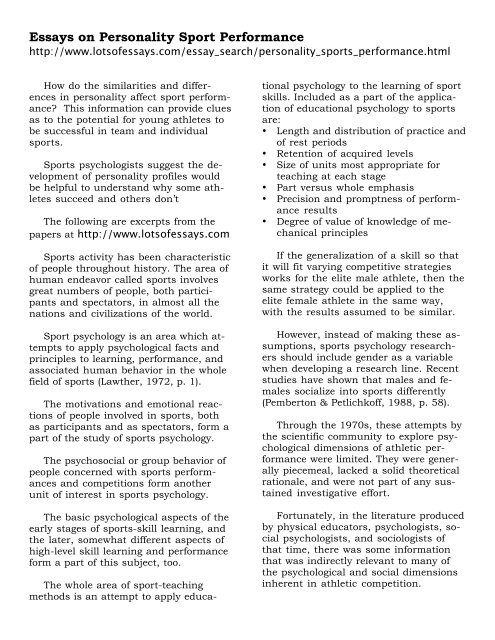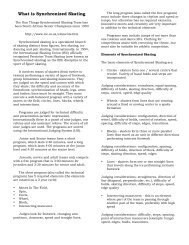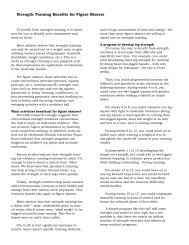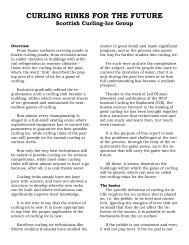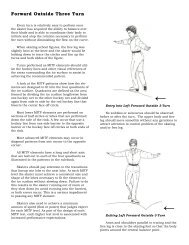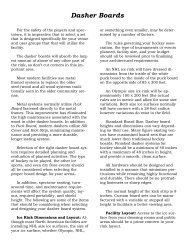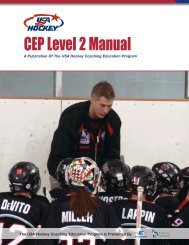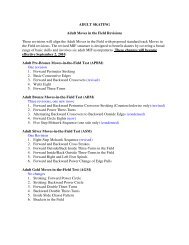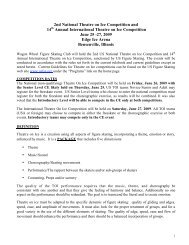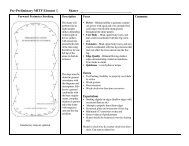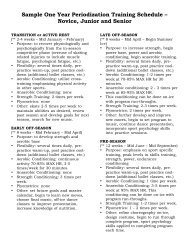Essays on Personality Sport Performance - Ice skating resources
Essays on Personality Sport Performance - Ice skating resources
Essays on Personality Sport Performance - Ice skating resources
Create successful ePaper yourself
Turn your PDF publications into a flip-book with our unique Google optimized e-Paper software.
<str<strong>on</strong>g>Essays</str<strong>on</strong>g> <strong>on</strong> Pers<strong>on</strong>ality <strong>Sport</strong> <strong>Performance</strong><br />
http://www.lotsofessays.com/essay_search/pers<strong>on</strong>ality_sports_performance.html<br />
How do the similarities and differences<br />
in pers<strong>on</strong>ality affect sport performance<br />
This informati<strong>on</strong> can provide clues<br />
as to the potential for young athletes to<br />
be successful in team and individual<br />
sports.<br />
<strong>Sport</strong>s psychologists suggest the development<br />
of pers<strong>on</strong>ality profiles would<br />
be helpful to understand why some athletes<br />
succeed and others d<strong>on</strong>’t<br />
The following are excerpts from the<br />
papers at http://www.lotsofessays.com<br />
<strong>Sport</strong>s activity has been characteristic<br />
of people throughout history. The area of<br />
human endeavor called sports involves<br />
great numbers of people, both participants<br />
and spectators, in almost all the<br />
nati<strong>on</strong>s and civilizati<strong>on</strong>s of the world.<br />
<strong>Sport</strong> psychology is an area which attempts<br />
to apply psychological facts and<br />
principles to learning, performance, and<br />
associated human behavior in the whole<br />
field of sports (Lawther, 1972, p. 1).<br />
The motivati<strong>on</strong>s and emoti<strong>on</strong>al reacti<strong>on</strong>s<br />
of people involved in sports, both<br />
as participants and as spectators, form a<br />
part of the study of sports psychology.<br />
The psychosocial or group behavior of<br />
people c<strong>on</strong>cerned with sports performances<br />
and competiti<strong>on</strong>s form another<br />
unit of interest in sports psychology.<br />
The basic psychological aspects of the<br />
early stages of sports-skill learning, and<br />
the later, somewhat different aspects of<br />
high-level skill learning and performance<br />
form a part of this subject, too.<br />
The whole area of sport-teaching<br />
methods is an attempt to apply educati<strong>on</strong>al<br />
psychology to the learning of sport<br />
skills. Included as a part of the applicati<strong>on</strong><br />
of educati<strong>on</strong>al psychology to sports<br />
are:<br />
• Length and distributi<strong>on</strong> of practice and<br />
of rest periods<br />
• Retenti<strong>on</strong> of acquired levels<br />
• Size of units most appropriate for<br />
teaching at each stage<br />
• Part versus whole emphasis<br />
• Precisi<strong>on</strong> and promptness of performance<br />
results<br />
• Degree of value of knowledge of mechanical<br />
principles<br />
If the generalizati<strong>on</strong> of a skill so that<br />
it will fit varying competitive strategies<br />
works for the elite male athlete, then the<br />
same strategy could be applied to the<br />
elite female athlete in the same way,<br />
with the results assumed to be similar.<br />
However, instead of making these assumpti<strong>on</strong>s,<br />
sports psychology researchers<br />
should include gender as a variable<br />
when developing a research line. Recent<br />
studies have shown that males and females<br />
socialize into sports differently<br />
(Pembert<strong>on</strong> & Petlichkoff, 1988, p. 58).<br />
Through the 1970s, these attempts by<br />
the scientific community to explore psychological<br />
dimensi<strong>on</strong>s of athletic performance<br />
were limited. They were generally<br />
piecemeal, lacked a solid theoretical<br />
rati<strong>on</strong>ale, and were not part of any sustained<br />
investigative effort.<br />
Fortunately, in the literature produced<br />
by physical educators, psychologists, social<br />
psychologists, and sociologists of<br />
that time, there was some informati<strong>on</strong><br />
that was indirectly relevant to many of<br />
the psychological and social dimensi<strong>on</strong>s<br />
inherent in athletic competiti<strong>on</strong>.
Pers<strong>on</strong>ality and <strong>Sport</strong>s <strong>Performance</strong><br />
Studies<br />
The growing knowledge about aptitude,<br />
abilities, and skills has just begun to explain<br />
performance differences, in terms of<br />
depending to some extent <strong>on</strong> the individual's<br />
unique and pers<strong>on</strong>al and behavioral<br />
dispositi<strong>on</strong>s.<br />
Such dispositi<strong>on</strong>s that an individual<br />
brings to a performance are not fully understood,<br />
neither as to the nature of the<br />
predispositi<strong>on</strong> nor as to the predictive<br />
value.<br />
This is not surprising, given that the<br />
field of pers<strong>on</strong>ality trait theories within<br />
psychology is a complex and imprecise<br />
science.<br />
Yet these theories purport to deal<br />
with such issues as the permanence of<br />
pers<strong>on</strong>ality states, the effects of cognitive<br />
and perceptual styles, the nature of<br />
motivati<strong>on</strong>, and the individual's mode of<br />
interpreting learning experiences.<br />
They were more c<strong>on</strong>cerned with bodily<br />
safety than were the triathletes, and they<br />
were more aut<strong>on</strong>omous than runners.<br />
Triathletes scored significantly lower<br />
than runners and swimmers but did not<br />
differ from cyclists <strong>on</strong> the "harm avoidance"<br />
scale.<br />
A study by Howard, Cunningham, and<br />
Rechnitzer (1987) used l<strong>on</strong>gitudinal data<br />
to determine the effects of pers<strong>on</strong>ality <strong>on</strong><br />
the natural decline in fitness in 121 middle-aged<br />
men.<br />
At the beginning of the study, pers<strong>on</strong>ality<br />
was assessed using the 16PF. Fitness<br />
measures included grip strength,<br />
predicted body fatness, and predicted<br />
maximum oxygen intake.<br />
It was found that the sec<strong>on</strong>d-order<br />
pers<strong>on</strong>ality dimensi<strong>on</strong>, introversi<strong>on</strong>extroversi<strong>on</strong>,<br />
was related to grip strength<br />
and predicted maximum oxygen uptake<br />
but not to body fatness.<br />
The physical educati<strong>on</strong> literature<br />
dealing with pers<strong>on</strong>ality factors and their<br />
effects <strong>on</strong> performance is heavy with implied<br />
and stated links between pers<strong>on</strong>ality<br />
development and involvement in appropriately<br />
c<strong>on</strong>ducted programs of<br />
planned physical activity, games, dance,<br />
and sport.<br />
Some individuals are motivated to<br />
achieve and have the determinati<strong>on</strong> and<br />
perseverance to do whatever work is necessary.<br />
This pers<strong>on</strong> is more a leader than<br />
a follower and may object more than most<br />
when restricted or prevented from doing<br />
things in his or her own way.<br />
These authors found a similar mode of<br />
resp<strong>on</strong>ding am<strong>on</strong>g the various sports.<br />
Swimmers were not as aggressive as cyclists<br />
or triathletes, and they were not as<br />
carefree as runners or triathletes.


